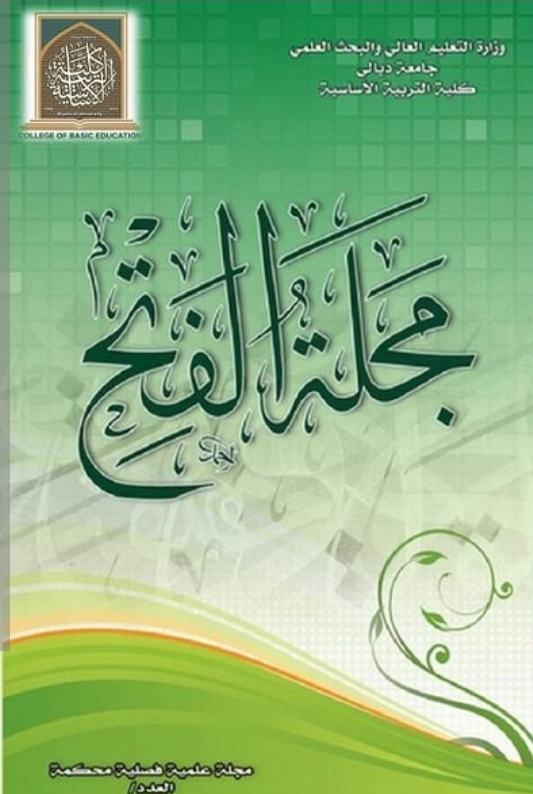مدى تطبيق معايير الجوده الشاملة فى المؤسسات التربوية العراقية من منظور الادارة والمعلمين
DOI:
https://doi.org/10.23813/FA/23/1/1الكلمات المفتاحية:
معايير الجودة الشاملةالملخص
تكمن مشكلة هذا البحث في معرفة اهمية تطبيق ثقافة الجودة الشاملة في المؤسسات التربوية العراقية من منظور الادارة المدرسية ومنظور المعلمين ومن هنا تم تلخيص مشكلة البحث بالآتي :
1- مدى تطبيق ثقافة معايير الجودة الشاملة في المؤسسات التربوية العراقية ؟
ويتفرع عن هذا السؤال أسئلة فرعية هي:
أ - مامدى تطبيق المؤسسات التربوية العراقية لثقافة معايير الجودة الشاملة من منظور الادارة؟
ب- مامدى تطبيق المؤسسات التربوية العراقية لثقافة معايير الجودة الشاملة من منظور المعلمين ؟
ووضعت الباحثة مجموعة من الفروض للوصول الى حل المشكلة تتمثل بما يلي:
هنالك علاقة ذات دلالة احصائية بين تطبيق ثقافة معايير الجودة الشاملة وجودة التعليم بالمؤسسات التربوية العراقية ؟
وتتفرع منها الفرضيات الاتية :
1- تطبق ثقافة معايير الجودة الشاملة في المؤسسات التربوية العراقية من منظور الادارة .
2- تطبق ثقافة معايير الجودة الشاملة في المؤسسات التربوية العراقية من منظور المعلمين .
وقد توصل البحث إلى النتائج الآتية:
1- المدير له القدرة على تحديد مواطن القوة والضعف داخل المؤسسة .
2- يشجع المدير المعلمين وجميع العاملين داخل المدرسة من اجل مواصلة تعليمهم وتطويرهم الذاتي .
3- الاستعانة بأخصائين في مجال الجودة التعليمية لتدريب المعلمين والمدرسين على تطبيقها .
4- استفاد الأساتذة من البرامج التدريبية في مجال الجودة التعليمية .
وبناء على ذلك توصى الباحثة بما يلي:
1- تحفيز الأساتذة والعاملين ماديا ومعنويا ليؤدوا عملهم بإتقان .
2- العمل على بث فكرة الادارة الذاتية اي ان المؤسسة هي ملك لجميع العاملين فيها.
3- العمل على إقامة دورات و برامج تدريبية متعقلة بثقافة الجودة الشاملة .
4- الاستمرار في سياسة تحديث المعدات والأدوات المساعدة بالمؤسسات .
وقد استخدمت الباحثة الوسائل الاحصائية وهي (التكرارات والنسبة المئوية) لتحليل البيانات الأساسية وفي الاجابة على أسئلة الفرضيات عن طريق برنامج الحزم الإحصائية (SPSS) للحصول على النتائج. وكذلك تم استخدام الإحصاءات الوصفية وهي (الوسط الحسابي ، الانحراف المعياري ، المنوال) لمعرفة اتجاهات عبارات كل فرضية ولإثبات صحة الفرض أو عدم صحته أو مدى توافق العبارات مع الفرض. تم استخدام مربع كاي.
المراجع
- ابراهيم وجيه محمود , التعلم – أسسه و نظرياته وتطبيقاته – , الإسكندرية : دار المعرفة الجامعية للطبع والنشر والتوزيع , 2006 , ص .229
أحمد إبراهيم أحمد، الجودة الشاملة في الإدارة التعليمية والمدرسية (الإسكندرية : دار الوفاء لدنيا الطباعة والنشر ، 2003 ) ص .166
أحمد إسماعيل حجى , إدارة بيئة التعليم والتعلم - النظرية والممارسة في الفصل والمدرسة ،مرجع سابق, ص 29.
ربيع محمد و طارق عبد الرؤوف عامر , الديمقراطية المدرسية , عمان : دار اليازوري العلمية للنشر والتوزيع 2008 , ص 14.
صالح ناصر عليمات ، إدارة الجودة الشاملة في المؤسسات التربوية –التطبيق و مقترحات التطوير( عمان: دار الشروق للنشر والتوزيع، دن ) ص .96
صباح سليم حمودة , مذكرة ماجستير بعنوان :درجة تطبيق إدارة الجودة الشاملة في المدارس الثانوية الخاصة في العاصمة عمان من وجهة نظر المديرين , جامعة الشرق الأوسط للدراسات العليا ، عمان ، 2008 ، ص31.
طارق عبد الرؤوف عامر , التربية والتعليم المستمر , عمان : دار اليازوري العلمية للنشر و التوزيع 2007 , ص 11.
عشيبة ، فتحي درويش ، الجودة الشاملة وامكانية تطبيقها في التعليم الجامعي ، مجلة اتحاد الجامعات العربية ، العدد 3 ، القاهرة ، مصر 2000 .
عليمات ، صالح ناصر ، ادارة الجودة الشاملة في المؤسسات التربوية ، التطبيق ومقترحات التطوير ، ط1 ، دار الشروق للنشر والتوزيع ، عمان ، الاردن ، 2004 .
فاروق عبده فليه ، إقتصاديات التعليم - مبادئ راسخة و اتجاهات حديثة (عمان: دار المسيرة للنشر و التوزيع و الطباعة ، 2007 )ص. 343
الفقاوي ، زينب محمد ، تحليل تكنولوجيا المعلومات للصف الحادي عشر في ضوء معايير الثقافة الحاسوبية ومدى اكتساب الطلبة لها ، رسالة ماجستير غير منشورة ، كلية التربية ، الجامعة الاسلامية ، غزة ، فلسطين ، 2007 .
محسن علي عطية ، الجودة الشاملة والجديدة في التدريس ( عمان: دار صفاء للنشر والتوزيع ، 2009 ) ص 117.
محمد جاد أحمد , التجديد التربوي في التعليم قبل الجامعي , الإسكندرية : العلم والإيمان للنشر و التوزيع , 2008 , ص. 100
محمد عطوة مجاهد , المدرسة والمجتمع في ضوء مفاهيم الجودة , الإسكندرية : دار الجامعة الجديدة للنشر 2008 , ص 9.
النجار ، فريد ، ادارة الجامعات بالجودة الشاملة ، دار ايترك للنشر والتوزيع ، مصر ، القاهرة ، 2000 .
الغميز , نايف خالد : مدى تطبيق ادارة الجودة الشامة في وزارة التعليم العالي السعودي من وجهة نظر مديري ورؤساء الأقسام , رسالة ماجستير غير منشورة , كلية التربية –جامعة اليرموك .
des. L. A: “ On the road to quality”, Congress library, U.S.A, 1997, P37
Peter Mortimore : “Measuring Educational Quality”, British Journal of Educational Studies,Vol(39),N0(1), February 1991, P70
التنزيلات
منشور
كيفية الاقتباس
إصدار
القسم
الرخصة
الحقوق الفكرية (c) 2023 حسن عبد الرحمن الحسن، مها صفاء الدين ياسين عبدالخضر العبادي

هذا العمل مرخص بموجب Creative Commons Attribution 4.0 International License.
حقوق النشر والترخيص
تطبق مجلة الفتح للبحوث التربوية والنفسية ترخيص CC BY (ترخيص Creative Commons Attribution 4.0 International). يسمح هذا الترخيص للمؤلفين بالاحتفاظ بملكية حقوق الطبع والنشر لأوراقهم. لكن هذا الترخيص يسمح لأي مستخدم بتنزيل المقالة وطباعتها واستخراجها وإعادة استخدامها وأرشفتها وتوزيعها ، طالما تم منح الائتمان المناسب للمؤلفين ومصدر العمل. يضمن الترخيص أن المقالة ستكون متاحة على نطاق واسع بقدر الإمكان وأن المقالة يمكن تضمينها في أي أرشيف علمي.
لمزيد من المعلومات، يرجى متابعة الرابط: https://creativecommons.org/licenses/by/4.0/.



